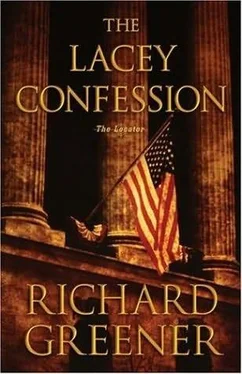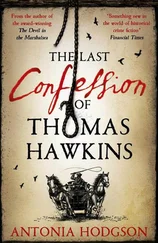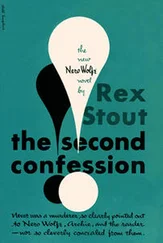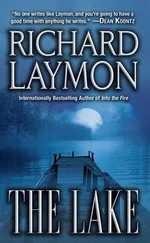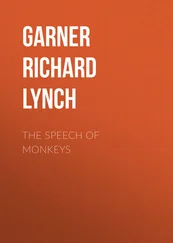Richard Greener - The Lacey confession
Здесь есть возможность читать онлайн «Richard Greener - The Lacey confession» весь текст электронной книги совершенно бесплатно (целиком полную версию без сокращений). В некоторых случаях можно слушать аудио, скачать через торрент в формате fb2 и присутствует краткое содержание. Жанр: Шпионский детектив, на английском языке. Описание произведения, (предисловие) а так же отзывы посетителей доступны на портале библиотеки ЛибКат.
- Название:The Lacey confession
- Автор:
- Жанр:
- Год:неизвестен
- ISBN:нет данных
- Рейтинг книги:3 / 5. Голосов: 1
-
Избранное:Добавить в избранное
- Отзывы:
-
Ваша оценка:
- 60
- 1
- 2
- 3
- 4
- 5
The Lacey confession: краткое содержание, описание и аннотация
Предлагаем к чтению аннотацию, описание, краткое содержание или предисловие (зависит от того, что написал сам автор книги «The Lacey confession»). Если вы не нашли необходимую информацию о книге — напишите в комментариях, мы постараемся отыскать её.
The Lacey confession — читать онлайн бесплатно полную книгу (весь текст) целиком
Ниже представлен текст книги, разбитый по страницам. Система сохранения места последней прочитанной страницы, позволяет с удобством читать онлайн бесплатно книгу «The Lacey confession», без необходимости каждый раз заново искать на чём Вы остановились. Поставьте закладку, и сможете в любой момент перейти на страницу, на которой закончили чтение.
Интервал:
Закладка:
“Do you want me to bring back anything for you?” the other man responded.
“No, Lee. Thank you. Just go now.”
Alone, the man whose name was not Hecht at all, but whose real name was Josef Gambrinus, calmly assembled the rifle, loaded it and placed it on the floor under the open window, the one he had chosen carefully the day before. He stacked three shipping boxes, boxes once filled with textbooks but now empty, one on top of the other and maneuvered them into position between the open window and the door leading onto the sixth floor. He meant to hide sight of the rifle from anyone who might happen to pass by. The noise of the crowd gathering below filtered up to him. He hoped the murmur of anticipation, followed by the expectant cheers, would erupt at the proper moment. The Czech would have liked it as loud as possible, but he realized, as he knew he must, there are some things beyond our control. It was not realistic to expect every detail to fall exactly into place. They rarely did. Nevertheless, he was ready. And he waited.
The middle-aged man from Amman, short and stocky, always looked like he needed a shave. He called himself Namdar, but his real name was unknown to anyone outside Jordan. Not even his European associate knew-especially him. Namdar assumed, quite correctly, that Stephen Hecht was also a made-up name. As the sound of the crowd grew louder, Namdar passed along the rail tracks and approached a location on the fence. He too had chosen this spot the day before, just after learning the altered route the motorcade would take. Had anyone seen him they would have taken him for a railroad worker or perhaps the sort of man Americans called a hobo, men so commonly seen in rail yards and along the tracks. He was dressed in old, gray, shabby clothes and carried with him a long, thin, beat-up cardboard box. Inside the box was a rifle, exactly like the one now resting at the ready beneath the window on the sixth floor of the building across the street, down past the embankment lined with spectators, beyond the gentle bend in the road separating him from his associate, a spot he was certain would slow the speed of the car making his task a simple one. Like the Czech had done, the Jordanian assembled the contents of his box quickly. Then he held the loaded weapon against his leg, hidden under his long coat, and he too waited.
There was a third man, another eastern European, waiting on the curb just where the street began its slow turn toward the upcoming highway underpass. Although he was the third member of a team, Daniel Ondnok was unknown to his teammates. Neither his compatriot on the sixth floor nor his Jordanian accomplice peering down from above the grassy knoll were aware of Ondnok’s presence. Unlike them he had no rifle. Yet his role in this plan might be the most dangerous and his risk the greatest. For nearly a half-hour he had wandered among the crowd as they gathered in the plaza. He was a young man; clean cut, shorthaired, wearing a simple blue suit, white shirt and a skinny navy blue tie. In his jacket pocket he held an Italian pistol packed with nine rounds. Unlikely as it was that the man in the window and the one behind the grassy knoll would both miss their target, if they did, the Slovakian would finish the job up close. He prayed the night before and once again standing in the plaza-if things went just as planned-he would actually do nothing, earn a great deal of money and go on his way unseen. If, however, it went badly, he would do his job. No doubt he would be killed, but he would die certain his family would be well provided for. He asked Jesus the son, and God the father, for victory and a good aim for his comrades.
When the Presidential motorcade rolled into Dealey Plaza, Lee Harvey Oswald was still eating, alone in the lunchroom, nowhere near the window on the sixth floor of the Texas School Book Depository building. He had no idea how badly the cards were stacked against him. As the President’s open car approached the plaza, it slowed-just as the Jordanian knew it would. At that moment the Czech fired the first shot from the open window six floors above. The bullet struck the second son of Joseph P. Kennedy in the upper back just below the neck. Ripping through his chest, it exited his throat and tumbled in the air at more than 500 miles per hour, smashing into the Governor of Texas riding in the front seat. Startled by the sound, Governor Connally had quickly turned around to look behind him. The bullet hit his wrist. Kennedy was already in shock. Instinctively, he tried to raise his hands to his face. His upper body tipped forward, propelled by the force of the bullet’s blow to his back.
The assassin Gambrinus had shot many people-men, women, even children-so he knew the hit was not fatal. In the quickest fraction of a second, angry with himself and thoroughly dissatisfied with the accuracy of his weapon, he squeezed off a second shot. It missed everything. Harmlessly, the bullet struck a road sign, then careened against a curb and rolled to a stop nearly all the way to the highway underpass where it would be found later. In the instant following the second shot, the President’s driver realized they were under attack. He pushed down hard on the accelerator. Trees now blocked the shooter’s view. There was no chance a third shot from the sixth floor window could accomplish anything. He had failed. “Shit!” he mumbled in his native tongue. Nevertheless, acting as he had been instructed to, he wiped the rifle clean of his fingerprints, laid it down and left the building. Following his escape route he would drive a 1959 model Chevrolet, by himself, to Vancouver, British Columbia. He made his report along the way. A week later he flew to Japan, changed planes in Tokyo, and then on to Rome. While using the restroom, at the airport in Rome, he was assaulted by three knife-wielding teenagers. After taking his wallet and passport the young thieves cut his throat. Josef Gambrinus bled to death in a toilet stall.
Even before the Czech’s first shot, the Jordanian had the President of the United States directly in his scope. As the first shot hit the President from behind, Namdar pulled the trigger and let loose the bullet that killed John F. Kennedy. The shot struck straight into his head. It drove him backwards, tearing a piece from his skull, scattering portions of his brain on the back of the limousine, on the seat next to him, and on his frightened wife.
Less than ten seconds later, Namdar had dismantled the rifle, loaded it back into his box, and was gone. According to plan, he drove his 1962 Buick slowly to Los Angeles. He made many stops along the way, leaving pieces of his weapon scattered, many miles apart, in the desert and sagebrush from west Texas to California. He made his report before staying with friends in Los Angeles, people who knew nothing of his activities. For six weeks he waited, celebrating the coming of the New Year 1964 before flying to Montreal and then on to Athens. As prearranged, he booked passage on a ship from Greece to Egypt. Finally, in the first week of February, he made it home to his well-earned, comfortable retirement. His most lucrative job would also be his last. Two weeks later, on a busy street in Amman, he was hit by a truck and killed. All who saw it said it was an unfortunate accident. Witnesses, people who waited with him on the sidewalk at the intersection, said he seemed to jump in front of the truck. No one noticed or remembered the man who pushed Namdar from behind.
The third man, Ondnok, had watched it all, only a few yards away from the target. He heard all three shots. Of course, he enjoyed the advantage of knowing when they would come. The panic of the crowd did not disturb him. He too had seen many men shot with a high-powered rifle. The blow that struck the American President in the skull had clearly done the job. As the limousine sped away, Ondnok turned and walked in the other direction. He never drew his pistol. He never did anything. He knew a dead man when he saw one. His prayers had been answered.
Читать дальшеИнтервал:
Закладка:
Похожие книги на «The Lacey confession»
Представляем Вашему вниманию похожие книги на «The Lacey confession» списком для выбора. Мы отобрали схожую по названию и смыслу литературу в надежде предоставить читателям больше вариантов отыскать новые, интересные, ещё непрочитанные произведения.
Обсуждение, отзывы о книге «The Lacey confession» и просто собственные мнения читателей. Оставьте ваши комментарии, напишите, что Вы думаете о произведении, его смысле или главных героях. Укажите что конкретно понравилось, а что нет, и почему Вы так считаете.
